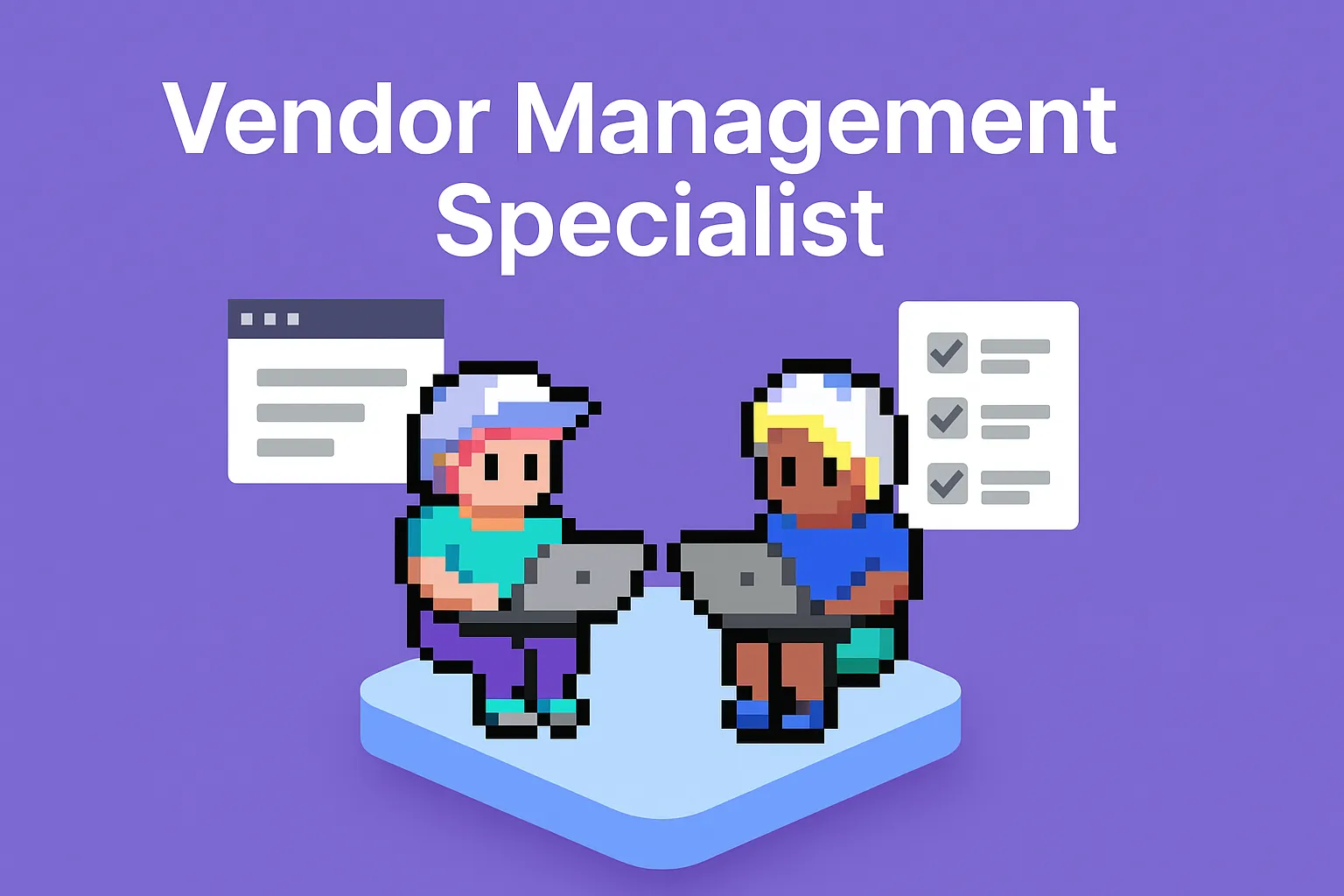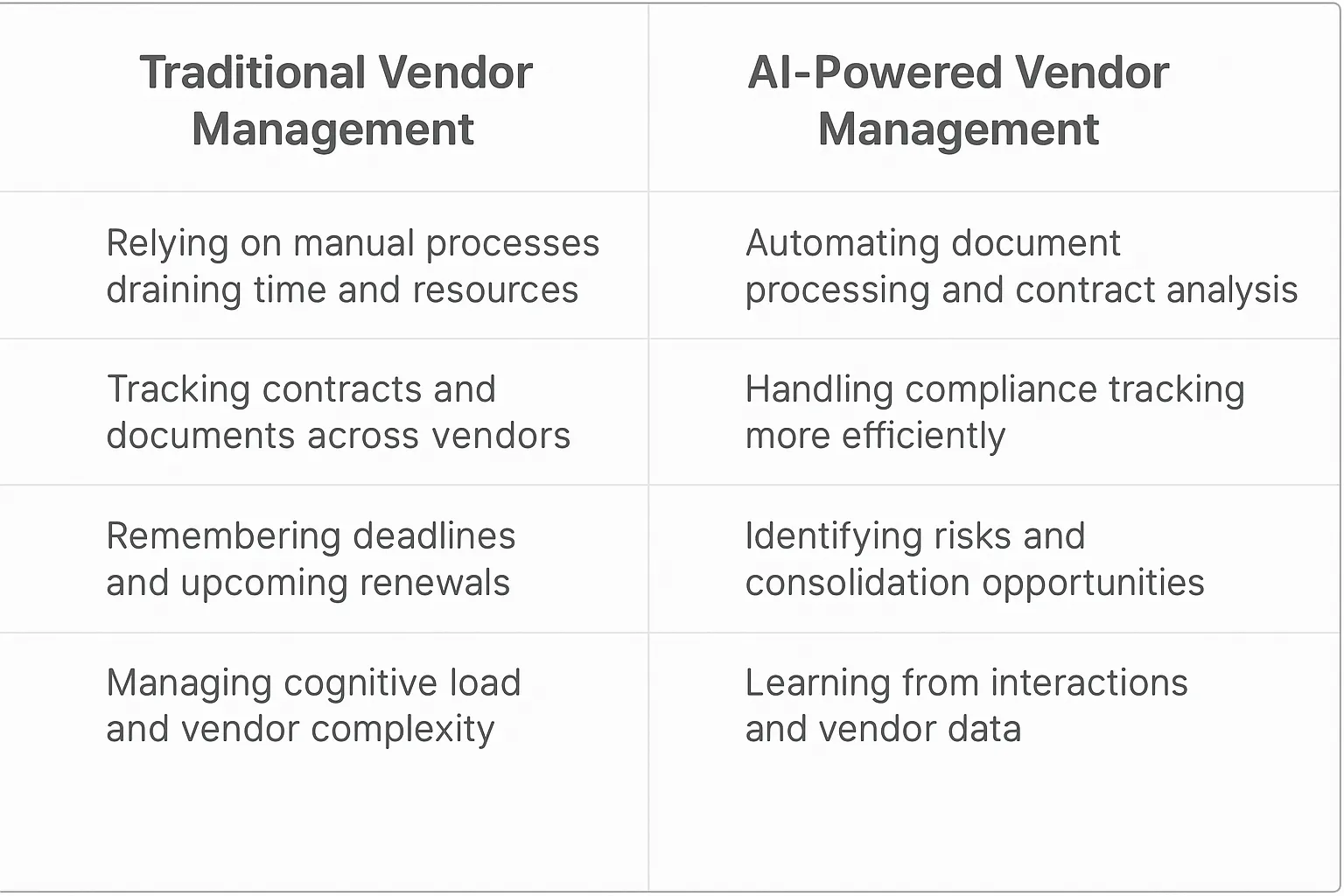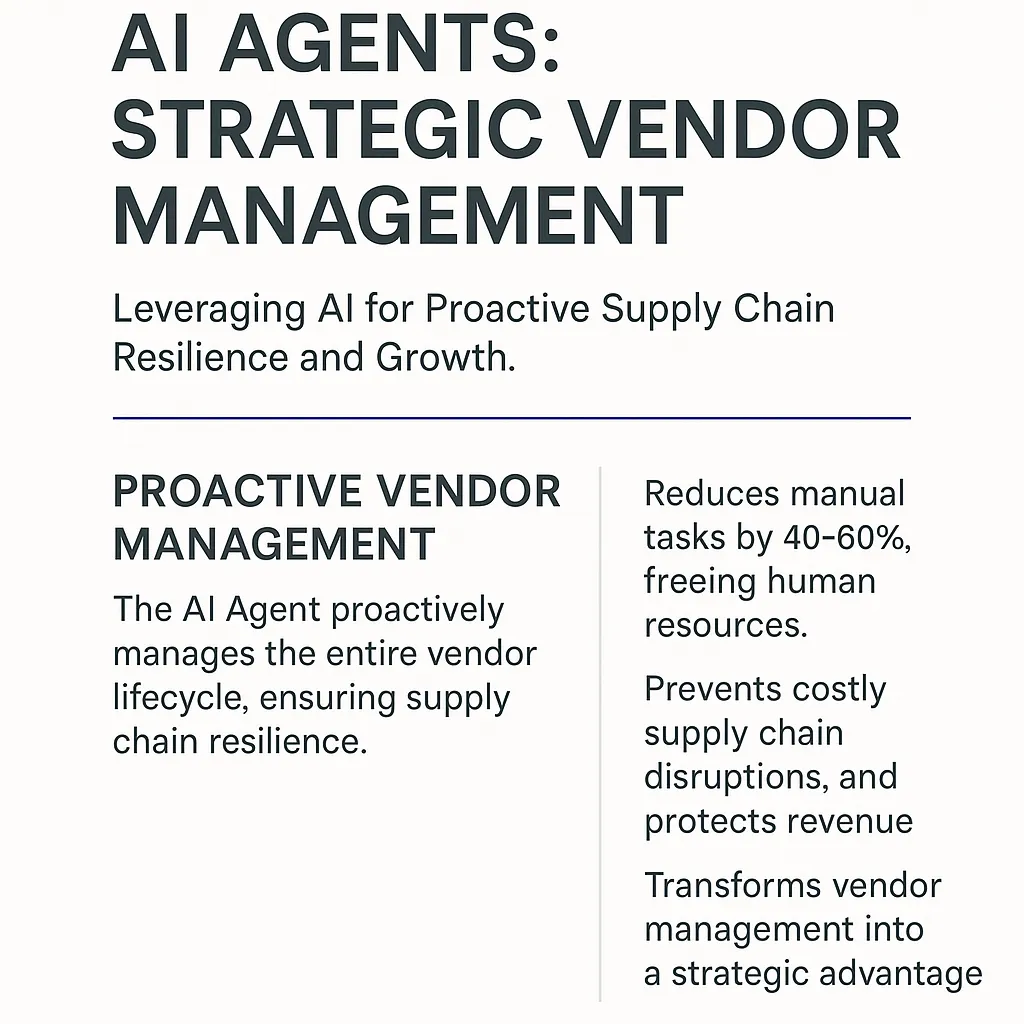A Vendor Management Specialist is an AI-powered system that transforms how organizations handle their supplier relationships. It acts as a digital teammate that manages the entire vendor lifecycle - from initial onboarding through ongoing relationship management and performance monitoring. The system combines advanced pattern recognition, natural language processing, and predictive analytics to automate complex vendor management tasks while continuously learning from each interaction.

Traditional vendor management relied heavily on manual processes that drained both time and resources. Procurement teams spent countless hours juggling spreadsheets, email threads, and clunky vendor portals. They'd manually track contract renewals, compliance documents, and performance metrics across dozens or hundreds of suppliers. The cognitive load was intense - trying to remember which vendor needed what document by when, or which contracts were approaching renewal.
The shift to AI-powered vendor management creates a fundamental change in how teams handle supplier relationships. Digital teammates now handle the heavy lifting of document processing, contract analysis, and compliance tracking - tasks that previously consumed 40-60% of a procurement professional's time.
These AI agents excel at pattern recognition across vast amounts of vendor data. They can spot pricing inconsistencies, identify opportunities for vendor consolidation, and flag potential compliance risks before they become issues. The agents continuously learn from each interaction, building deeper understanding of your vendor ecosystem.
A key advantage is the agents' ability to maintain consistent communication cadence with vendors. They automatically follow up on missing documents, send renewal reminders, and keep all stakeholders updated without dropping the ball. This systematic approach reduces the risk of oversights that could lead to supply chain disruptions or compliance violations.
The network effects are particularly powerful here - as more organizations adopt AI vendor management, these digital teammates get better at identifying industry benchmarks, predicting supplier risks, and surfacing strategic insights. We're seeing early adopters report 30-40% reduction in vendor management overhead while simultaneously improving compliance rates and supplier relationship scores.
For procurement teams, this means shifting from reactive firefighting to strategic supplier partnership development. The AI handles the operational heavy lifting, freeing up humans to focus on relationship building, innovation partnerships, and strategic sourcing decisions that drive real business value.

When we look at vendor management through the lens of AI agents, we're seeing a fundamental shift in how businesses handle their supplier relationships. The traditional vendor management cycle - evaluate, onboard, monitor, repeat - transforms into a dynamic, data-driven growth loop.
The most interesting aspect is how these digital teammates create compounding effects. Each vendor interaction generates data that feeds back into the system, making future vendor decisions more intelligent. This creates what I call "vendor relationship network effects" - where the value of your vendor management system increases with each new supplier relationship.
What's particularly fascinating is the emergence of prediction-driven vendor optimization. AI agents don't just track vendor performance - they anticipate potential issues before they become problems. This shifts vendor management from a reactive to a proactive discipline, fundamentally changing the game for procurement teams.
The key insight here is that AI agents in vendor management aren't just about automation - they're about building institutional knowledge that compounds over time. Each contract analysis, each performance review, each risk assessment adds to a growing knowledge base that makes future vendor decisions more sophisticated and data-informed.

The impact of vendor management AI agents extends far beyond basic procurement tasks - they're fundamentally reshaping how organizations build and maintain their supplier relationships. Drawing from my experience working with growth-stage companies, I've observed these digital teammates becoming integral parts of procurement teams across multiple sectors.
When we analyze the vendor management landscape, we see AI agents taking on increasingly sophisticated roles - from conducting initial vendor screenings to maintaining ongoing supplier relationships. They're particularly effective at identifying risk factors and compliance issues that humans might miss in complex vendor agreements.
What makes these AI agents particularly compelling is their ability to adapt to industry-specific requirements while maintaining consistent performance across different organizational contexts. The real value emerges when we examine how they're being deployed across various sectors - each with its unique vendor management challenges and regulatory requirements.
The following industry examples demonstrate how AI agents are creating measurable improvements in vendor management processes, while reducing the cognitive load on procurement teams. These aren't just theoretical applications - they're real-world implementations that are delivering tangible results.
The manufacturing sector faces a unique challenge - managing hundreds or even thousands of component suppliers across multiple product lines. A Vendor Management Specialist AI agent transforms this complexity into a strategic advantage.
Take an electric vehicle manufacturer working with 2,300+ suppliers across 12 countries. Their digital teammate analyzes real-time data from each vendor, tracking metrics like delivery times, quality control reports, pricing fluctuations, and compliance documentation. When a critical battery supplier in South Korea shows early warning signs of production delays, the AI flags this 6-8 weeks before it would impact the production line.
But the agent doesn't just identify problems - it takes action. It automatically:- Reaches out to pre-approved backup suppliers- Negotiates temporary pricing agreements- Updates procurement schedules- Notifies affected departments- Maintains compliance documentation
The most fascinating aspect? The AI builds deep supplier relationship profiles by analyzing years of interaction data, identifying which vendors consistently go above and beyond, which ones require more oversight, and which ones are at risk of churning. This intelligence helps procurement teams make better strategic sourcing decisions.
The results speak for themselves: A mid-sized EV manufacturer using this approach reduced supplier-related production delays by 64% and cut procurement overhead costs by 31% in the first year. The AI's ability to process vast amounts of vendor data and take rapid action creates a competitive edge that would be impossible to achieve with traditional vendor management approaches.
Large hospital networks operate in a high-stakes environment where vendor management isn't just about costs - it's about patient outcomes. A major healthcare system I've worked with implemented a Vendor Management Specialist AI agent that's redefining how medical supply chains function.
The AI agent monitors 500+ medical suppliers across pharmaceuticals, equipment, and consumables. What's fascinating is how it integrates with electronic health records to predict demand spikes for specific supplies based on patient admission patterns and seasonal disease trends. When flu season approaches, the AI adjusts order quantities for relevant supplies weeks before human managers would typically react.
The digital teammate excels at complex compliance management, continuously verifying:- FDA certifications- Sterilization protocols- Temperature-controlled shipping logs- Batch tracking documentation- Expiration date monitoring
One of the most compelling features is the AI's ability to manage crisis scenarios. During a recent natural disaster that disrupted regular supply routes, the agent automatically:- Identified alternative suppliers within a 200-mile radius- Verified their emergency delivery capabilities- Negotiated priority shipping arrangements- Maintained cost controls despite surge pricing- Ensured all emergency suppliers met regulatory requirements
The numbers tell an impressive story: A 300-bed hospital network reduced expired inventory waste by 76%, cut emergency rush orders by 82%, and maintained 99.99% compliance with regulatory requirements. But the real win? Their nursing staff reports spending 45% less time on supply-related tasks, giving them more time for patient care.
Implementing a vendor management AI agent requires careful navigation of several technical complexities. The agent needs access to multiple data sources - vendor contracts, performance metrics, financial systems, and communication channels. Each integration point represents a potential failure mode that needs robust error handling. Many organizations struggle with data silos and legacy systems that weren't built for AI interaction, requiring custom middleware solutions.
The effectiveness of vendor management agents lives and dies by data quality. Most organizations face the reality of inconsistent vendor data formats, missing fields, and varying standards across departments. Procurement teams often have established workflows built over years. Building reliable machine learning models requires extensive data standardization work upfront. Without it, the agent's recommendations and insights will be fundamentally flawed.
Procurement teams often have established workflows built over years. Introducing an AI agent means disrupting those patterns. Some team members may resist shifting vendor interactions to a digital teammate. Others might over-rely on the agent without appropriate human oversight. Finding the right balance requires thoughtful change management and clear guidelines on human-AI collaboration.
Vendor data often contains sensitive financial and strategic information. The AI agent needs sophisticated security controls to prevent data leaks while maintaining usability. Compliance requirements like GDPR and CCPA add another layer of complexity - the agent must be programmed to handle data privacy regulations across different jurisdictions where vendors operate.
Defining success metrics for vendor management agents isn't straightforward. While cost savings are measurable, other benefits like improved vendor relationships or faster issue resolution are harder to quantify. Organizations need to develop comprehensive KPI frameworks that capture both hard and soft ROI measures to justify the investment and guide ongoing optimization.
The agent's effectiveness depends heavily on vendor participation. Getting vendors to adopt new communication channels and data sharing protocols takes time and resources. Some vendors, especially smaller ones, may lack the technical capabilities to integrate with AI systems. Creating vendor enablement programs and providing adequate support becomes crucial for success.
The integration of AI agents into vendor management marks a fundamental shift in how organizations build and maintain supplier relationships. These digital teammates don't just automate tasks - they create compound learning effects that make entire procurement operations more intelligent over time. The most successful implementations will be those that balance AI capabilities with human expertise, creating a symbiotic relationship where digital teammates handle operational complexities while humans focus on relationship building and strategic decision-making.
Looking ahead, we'll likely see even more sophisticated applications as these systems continue to evolve. The organizations that embrace this transformation now will build significant competitive advantages through more efficient, data-driven vendor relationships. The future of vendor management isn't just automated - it's intelligently augmented.